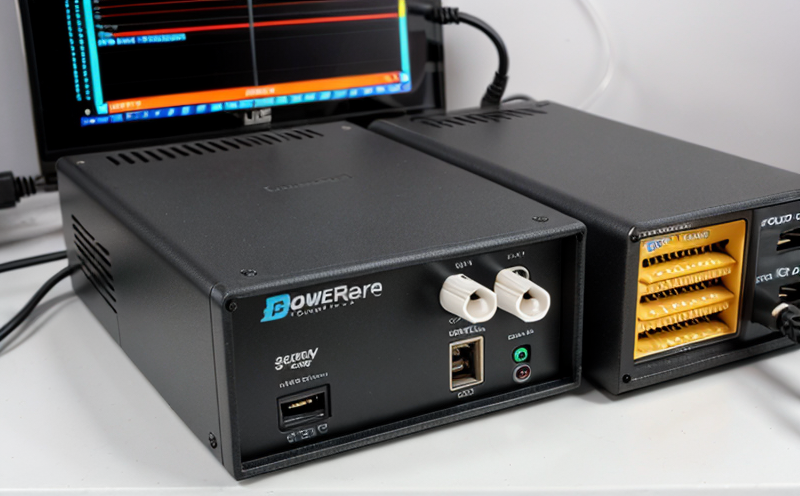UL 60601 Safety Testing for Medical Chargers
The UL 60601 standard is a cornerstone of medical device safety, setting stringent requirements to ensure the electrical safety of medical equipment. This includes chargers used in healthcare settings, which must comply with UL 60601-1 and its appendices for power supplies and connectors. Our service specializes in providing comprehensive testing tailored to meet these rigorous standards.
Medical chargers are critical components that provide safe charging solutions for portable medical devices such as defibrillators, pacemakers, and other life-supporting equipment. These devices must operate reliably under various conditions without posing risks like fire, electric shock, or over-temperature damage. UL 60601-1 covers the essential requirements for electrical safety, while appendices provide detailed guidance on specific tests.
Our testing service ensures that medical chargers meet all relevant standards and regulations. This includes conducting insulation resistance and strength tests to verify the integrity of the charger's insulation materials. We also perform dielectric strength tests using high-voltage AC to evaluate the ability of the charger components to withstand electrical stress without failure.
Other critical tests include ground fault protection, overcurrent protection, and electromagnetic compatibility (EMC) assessments. EMC testing ensures that chargers do not interfere with other medical devices or systems within the hospital environment. Our team uses state-of-the-art test equipment such as high-voltage testers, multimeters, and EMC chambers to conduct these tests.
The process begins with thorough preparation of the charger specimens according to industry best practices. This involves cleaning, labeling, and ensuring that all components are in their original condition. Once prepared, we subject each specimen to a series of tests designed to simulate real-world conditions they may encounter during use.
Testing is conducted in our ISO 17025 accredited laboratory using certified test equipment calibrated to international standards such as IEC 60601-1:2014. Our team of experienced engineers and technicians ensures that every test is performed with precision, accuracy, and repeatability.
The results are meticulously documented and reported in compliance with UL requirements. Reports include detailed descriptions of the tests conducted, any deviations from standards, and recommendations for improvements if necessary. Compliance with UL 60601-1 ensures not only safety but also trustworthiness, which is crucial for healthcare providers.
| Application | Description |
|---|---|
| Portable Medical Devices | Ensures safe charging of devices like defibrillators and pacemakers. |
| Surgical Equipment | Aids in the safe operation of equipment used during surgical procedures. |
| Hospital Monitoring Systems | Supports reliable operation of monitoring systems to ensure patient safety. |
- Portable Medical Devices: Defibrillators, pacemakers, and other life-supporting equipment.
- Surgical Equipment: Instruments used in surgical procedures.
- Hospital Monitoring Systems: Devices that monitor patients' vital signs during treatment.
Why It Matters
The importance of UL 60601 safety testing for medical chargers cannot be overstated. Electrical failures can lead to severe consequences, including patient injury or death. Compliance with this standard ensures that medical equipment remains safe and reliable throughout its lifecycle.
Beyond immediate safety concerns, compliance also enhances the reputation of manufacturers and healthcare providers. It demonstrates a commitment to excellence in product design and quality assurance. This trustworthiness is vital for maintaining long-term relationships with customers and stakeholders.
From an operational perspective, UL 60601-1 ensures that chargers perform consistently under various conditions. This consistency improves the overall performance of medical devices, leading to better patient outcomes. Moreover, compliance simplifies regulatory processes by aligning with international standards recognized globally.
In summary, our service plays a critical role in safeguarding public health by ensuring that medical chargers meet the highest safety standards. By doing so, we contribute to safer healthcare environments and enhance the reliability of life-saving devices.
Industry Applications
| Application | Description |
|---|---|
| Patient Monitoring Equipment | Ensures the safety of devices used to monitor vital signs. |
| Invasive Medical Devices | Guarantees safe operation of devices inserted into patient tissues. |
| Non-Invasive Medical Devices | Aids in the reliable function of devices that do not penetrate the skin. |
- Patient Monitoring Equipment: Devices like pulse oximeters and electrocardiogram (ECG) machines.
- Invasive Medical Devices: Catheters, endoscopes, and other instruments used in minimally invasive procedures.
- Non-Invasive Medical Devices: Blood pressure monitors, thermometers, and stethoscopes.
The versatility of UL 60601-1 allows it to be applied across various medical devices, ensuring that all components meet stringent safety requirements. This comprehensive approach enhances the overall safety and reliability of healthcare environments.
Environmental and Sustainability Contributions
Besides electrical safety, our UL 60601-1 testing service contributes to environmental sustainability by promoting energy efficiency in medical chargers. By ensuring that chargers operate safely under all conditions, we also help prevent waste and reduce the environmental impact of healthcare facilities.
Our tests focus on minimizing power consumption during standby modes, which can significantly reduce energy usage over time. This not only saves costs for hospitals but also reduces carbon footprints associated with electricity generation. Furthermore, our testing ensures that chargers do not generate excessive heat, thus reducing the need for cooling systems and their associated energy consumption.
By adhering to UL 60601-1 standards, we promote a culture of responsible design and manufacturing within the medical device industry. This commitment to sustainability is in line with global efforts to reduce environmental impact while improving healthcare delivery.





